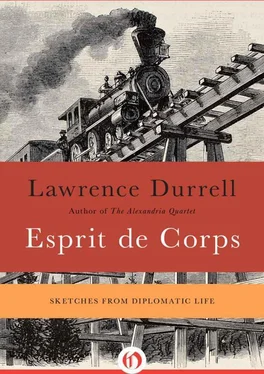“This incident unluckily coincided with two others; the first was that Drage walked on with a blazing pudding stuck with holly. Our guests were somewhat startled by this apparition, and Comrade Bobok, under the vague impression that the blazing pud must be ushering in a spell of diplomatic toasts, rose to his feet and cried loudly: ‘To Comrade Tito and the Communist People’s Serbian Trade and Timber Guild. Jiveo!’ His fellow Serbs rose as one man and shouted: ‘Jiveo!’
“By this time, however, light had begun to dawn on Polk-Mowbray. He let out a hoarse jarring cry full of despair and charred moth, stood up, threw up his arms and groped his way to the carafe on the sideboard, shaken by a paroxysm of coughing. Spalding and I rocked, I am sorry to say, with hysterical giggles, followed him to pat him on the back. To the startled eyes of the Yugoslavs we must have presented the picture of three diplomats laughing ourselves to death and slapping each other on the back at the sideboard, and utterly ignoring the sacred toast. Worse still, before any of us could turn and explain the situation Spalding’s elbow connected with Drage’s spinal cord. The butler missed his footing and scattered the pudding like an incendiary bomb all over the table and ourselves. The Yugoslav delegation sat there with little odd bits of pudding blazing in their laps or on their waistcoats, utterly incapable of constructive thought. Spalding, I am sorry to say, was racked with guffaws now which were infectious to a degree. De Mandeville who was holding the leg of the table and who had witnessed the tragedy also started to laugh in a shrill feminine register.

“I must say Polk-Mowbray rallied gamely. He took an enormous gulp of wine from the carafe and led us all back to table with apologies and excuses which sounded, I must say, pretty thin. What Communist could believe a capitalist hyena when he says that he has swallowed a moth? Drage was flashing about snuffing out pieces of pudding.
“We made some attempt to save the evening, but in vain. The awful thing was that whenever Spalding caught De Mandeville’s eye they both subsided into helpless laughter. The Yugoslavs were in an Irremediable Huff and from then on they shut up like clams, and took their collective leave even before the coffee was served.
“It was quite clear that Spalding’s Timber Pact was going to founder in mutual mistrust once more. The whole affair was summed up by the Central Balkan Herald in its inimitable style as follows: ‘We gather that the British Embassy organized a special dinner at which the Niece de Resistance was Glum Pudding and a thoroughly British evening was enjoyed by all.’ You couldn’t say fairer than that, could you?”
“Most F.O. types”, said Antrobus, “are rather apt to imagine that their own special department is more difficult to run than any other; but I must say that I have always handed the palm to you Information boys. It seems to me that Press work has a higher Horror Potential than any other sort.”
He is right, of course. Antrobus is always right, and even though I am no longer a foreign service type I am proud to be awarded even this tardy recognition when all is said and done.
A press officer is like a man pegged out on an African ant-hill for the termites of the daily press to eat into at will. Nor are we ever decorated. You never read of a press officer getting the George Cross for rescuing a reporter who has fallen into his beer. Mostly we just sit around and look as if we were sickening for an O.B.E.
And what can compare with the task of making journalists feel that they are loved and wanted — without which they founder in the Oedipus Complex and start calling for a Parliamentary Commission to examine the Information Services? Say what you like, it’s an unenviable job.
Most of the press officers I’ve known have gradually gone off their heads. I’m thinking of Davis who was found gibbering on the Nan Tal Pagoda in Bangkok. All he could say was: “For Immediate Release, absolutely immediate release.” Then there was Perry who used to boil eggs over a spirit-lamp in the office. He ended by giving a press conference in his pyjamas.
But I think the nicest and perhaps the briefest press officer I have ever known was Edgar Albert Ponting. He was quite unique. One wonders how he was recruited into so select a cadre. He was sent to me as second secretary in Belgrade. I had been pressing for help for some time with a task quite beyond me. The press corps numbered some fifty souls — if journalists can be said to have souls. I could not make them all feel loved and wanted at once. Trieste with its ghastly possibilities of a shooting war loomed over us: propaganda alone, I was told, could keep the balance — could keep it a shouting war. I turned to the Foreign Office for help. Help came, with all the traditional speed and efficiency. After two months my eleventh telegram struck a sympathetic chord somewhere and I received the information that Edgar Albert was on the way. It was a great relief. Fraternization with the press corps had by this time raised my alcohol consumption to thirty slivovitza a day. People said they could see a pulse beating on the top of my head. My Ambassador had taken to looking at me in a queer speculative way, with his head on one side. It was touch and go. But it was splendid to know that help was at hand. It is only forty odd hours from London to Belgrade. Ponting would soon be at my elbow, mechanically raising and lowering his own with the old Fleet Street rhythm press officers learn so easily.
Mentally, I toasted Ponting in a glass of sparkling Alka Seltzer and called for the Immediate file. From Paris came the news that he had not been found on the train. After a wait of four days a signal came through saying that he had been found. He was at present in St. Anne’s due for release later in the day when his journey would be resumed. I was rather uneasy as I remembered that St. Anne’s was a mental hospital, but my fears subsided as I followed his route and saw him safely flagged into Switzerland and down into Italy. There was an ominous pause at Pisa which lasted ten days. Then came a signal from the Embassy in Rome saying that our vice-consul there had located him and put him on the train. This was followed by an odd sort of telegram from Ponting himself which said: “Can’t tell you what impression Leaning Tower made on me old man. On my way. Avanti. Ponty.”
At Venice there was another hold-up, but it was brief. Our vice-consul was away. It appeared that Ponting had borrowed 1,000 lire from the consulate gondolier and represented himself to the clerks in the consulate as a distressed British subject domiciled in Lisbon. All this was of course disquieting, but, as I say, one gets used to a highly developed sense of theatre in press officers. They live such drab lives. Once he was through Trieste and Zagreb, however, I began to breathe more freely, and make arrangements to meet him myself.
The Orient Express gets in at night. I had planned a quiet little dinner at the flat during which I would unburden myself to Ponting and brief him as to the difficulties which faced us. (A visit from the Foreign Minister impended: rumours of Russian troop movements were at meridian: trade negotiations with Britain were at a delicate phase: and so on and so forth.)
He was not at the station: my heart sank. But Babic, the Embassy chauffeur, interrogated the wagon-lit attendant, and we learned with relief that Ponting had indeed arrived. “He must have walked,” said the attendant, “he had very little luggage besides the banjo. A little case like a lady’s handbag.”
Читать дальше













